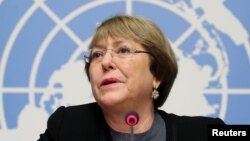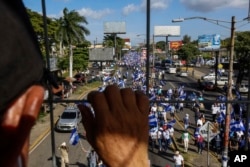U.N. human rights chief Michelle Bachelet is expressing alarm at growing repression in Nicaragua and warns the increasing criminalization of dissent is promoting political and social instability in the country.
Over the past six months, the government of Nicaraguan President Daniel Ortega has arrested hundreds of political opponents and activists, allegedly to muzzle them and keep their opinions from being heard.
The U.N. human rights office says those arrested and held in pre-trial detention for long periods allegedly had leading roles in last year's anti-government protests between April and July.
U.N. High Commissioner for Human Rights Michele Bachelet warned these hard-nosed tactics are seriously undermining proposed efforts to resolve the growing political and social unrest in Nicaragua.
The High Commissioner's spokesman, Rupert Colville, said guilty verdicts and extremely heavy sentences have been handed down to a number of prominent opposition and community leaders since December. He said some of these leaders had cooperated with the U.N. and have brought a number of human rights abuses in Nicaragua to its attention.
"The high commissioner is deeply concerned about the apparent lack of due process and increasing criminalization of dissent in Nicaragua. The arrest and jailing of opposition leaders, she says, is possibly in some cases could be a reprisal for cooperating with the U.N. and it clearly hinders the creation of an environment that is conducive to holding a genuine and inclusive dialogue, which the government says it wants," said the spokesman.
The government has blamed protests on criminal groups and "opposition political groups with specific political agendas." The government calls them "terrorists" and says it has "the duty to defend the security and peace."
Among those convicted in recent weeks is student leader Jonathan Lopez. He was sentenced to five years and three months in prison.
Peasant leaders Medardo Mairen and Pedro Mena have been sentenced to 216 and 210 years in prison respectively.
Sentences are pending for two former army officers, Carlos Brenes and Tomas Maldonado. The state prosecutor is seeking jail terms of 32 and 34 years respectively.
High Commissioner Bachelet is calling for these convictions and sentences to be reviewed by independent experts. This, to make sure their cases were properly handled at every stage—from arrest to prosecution.
She said all those arrested for protesting peacefully and exercising their freedom of expression should be released.





